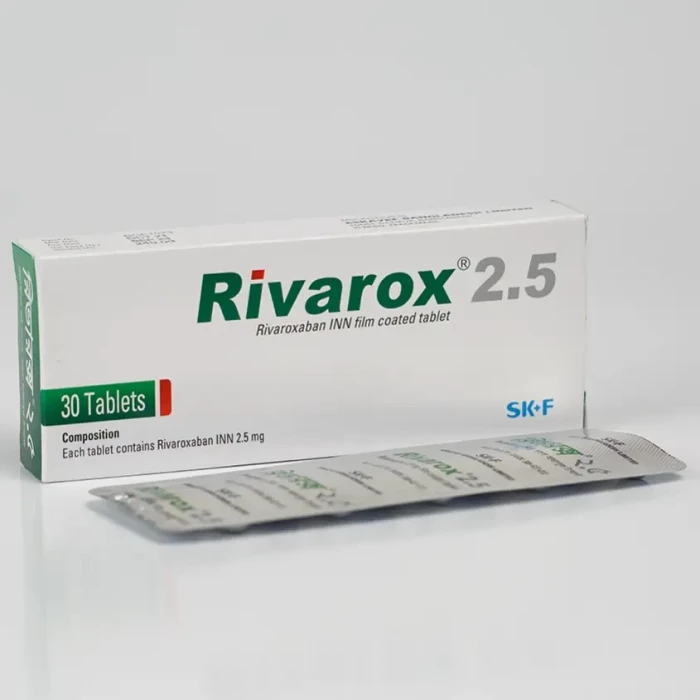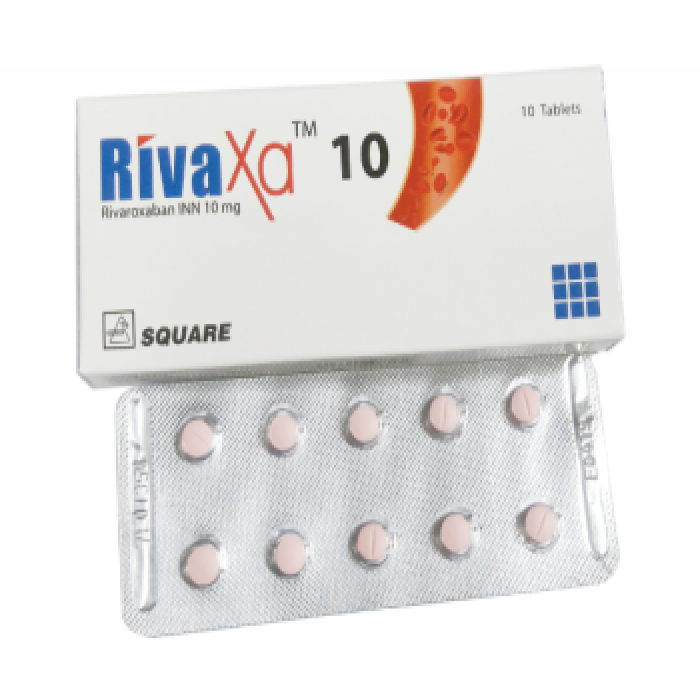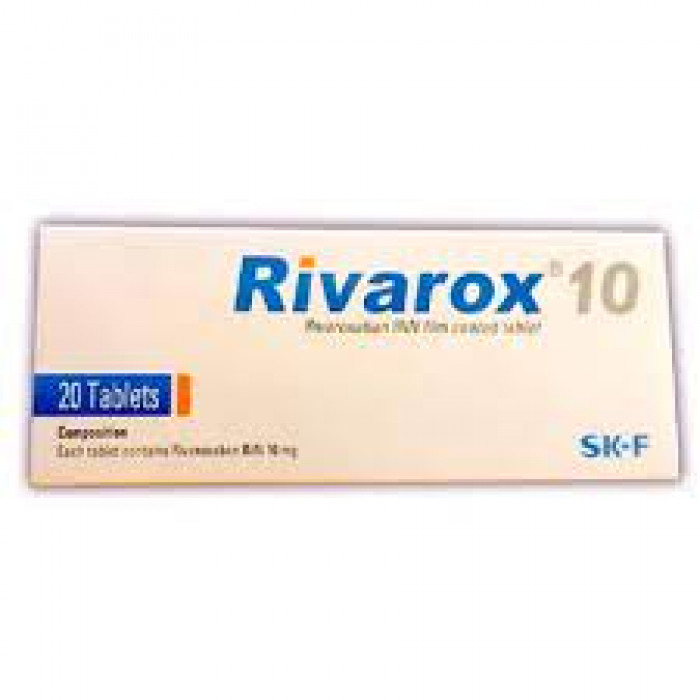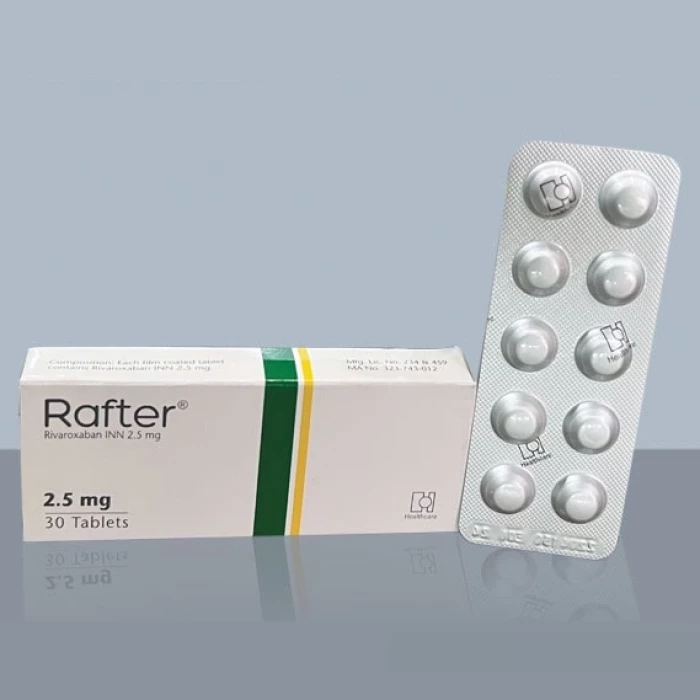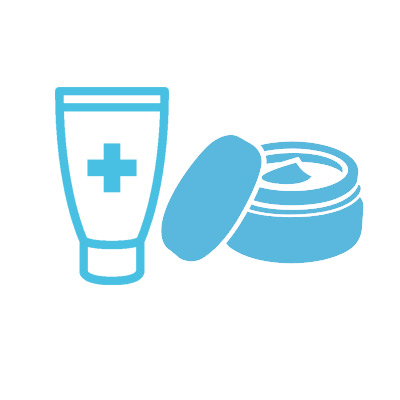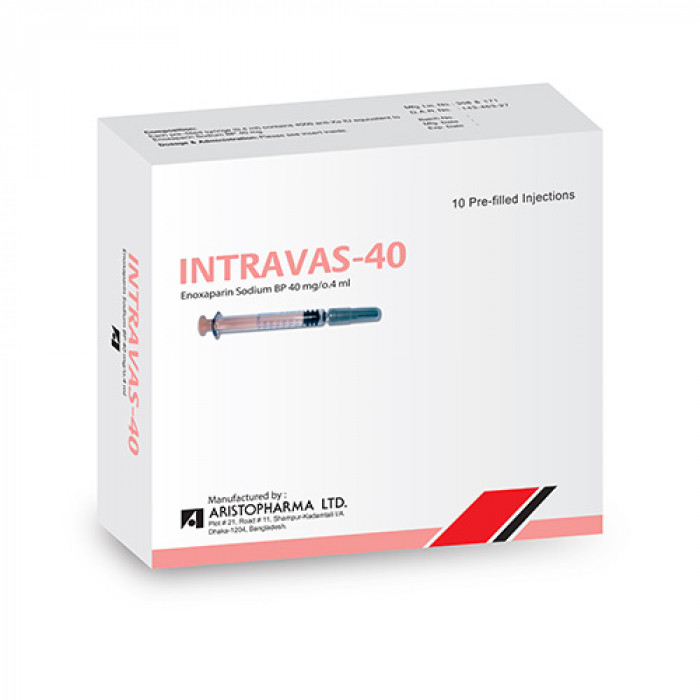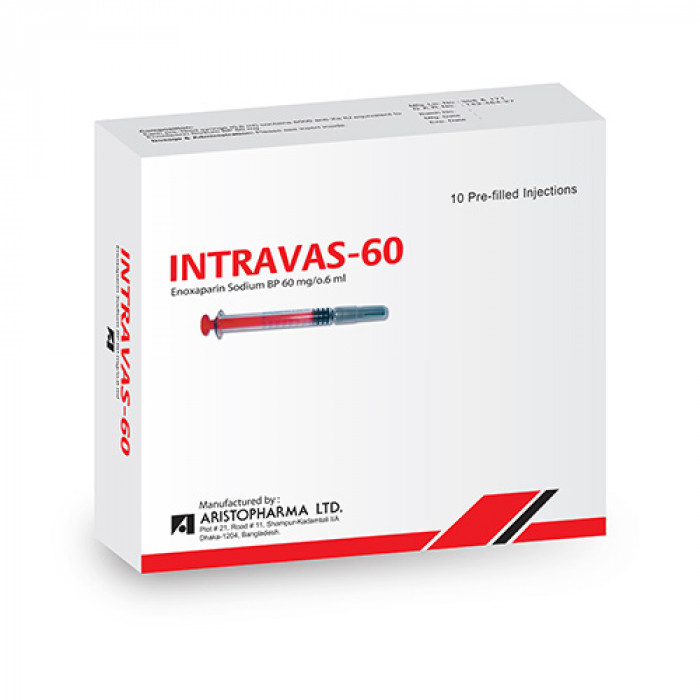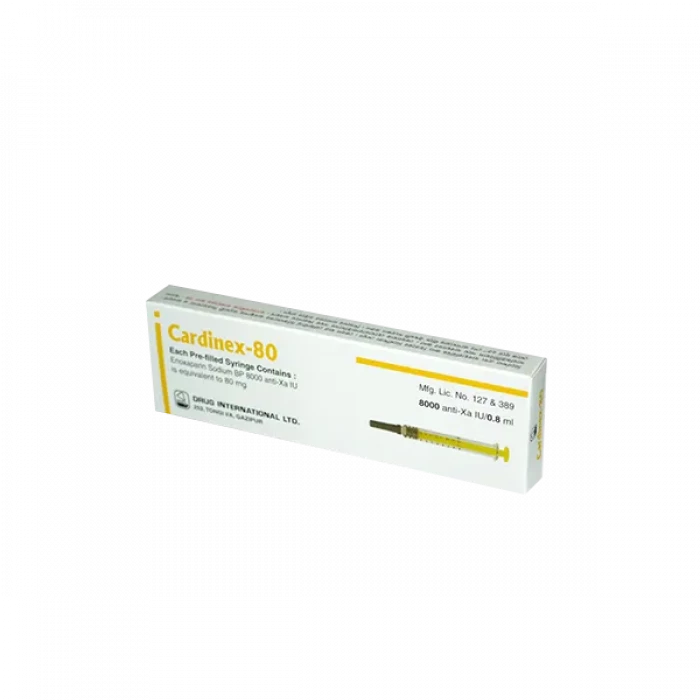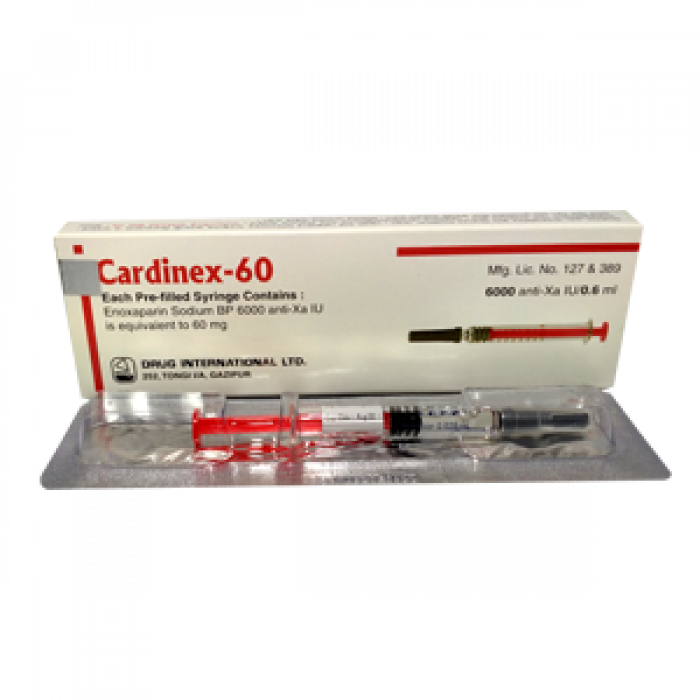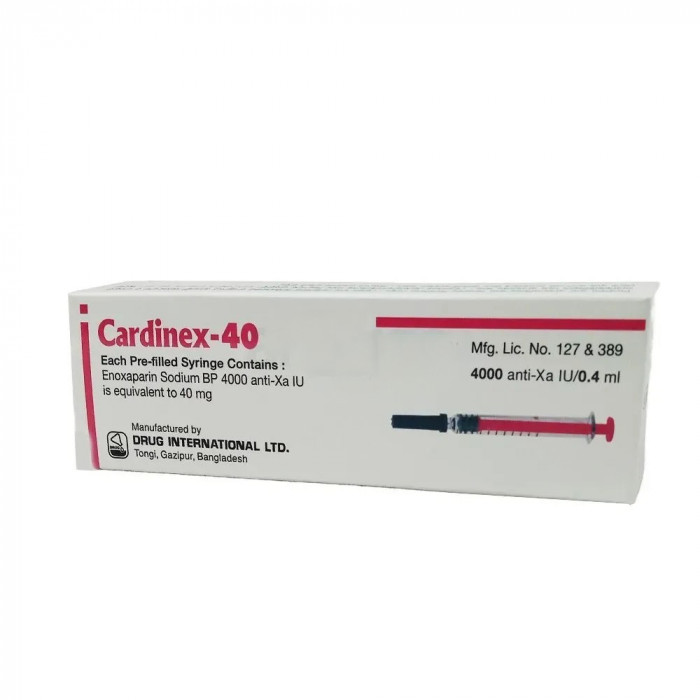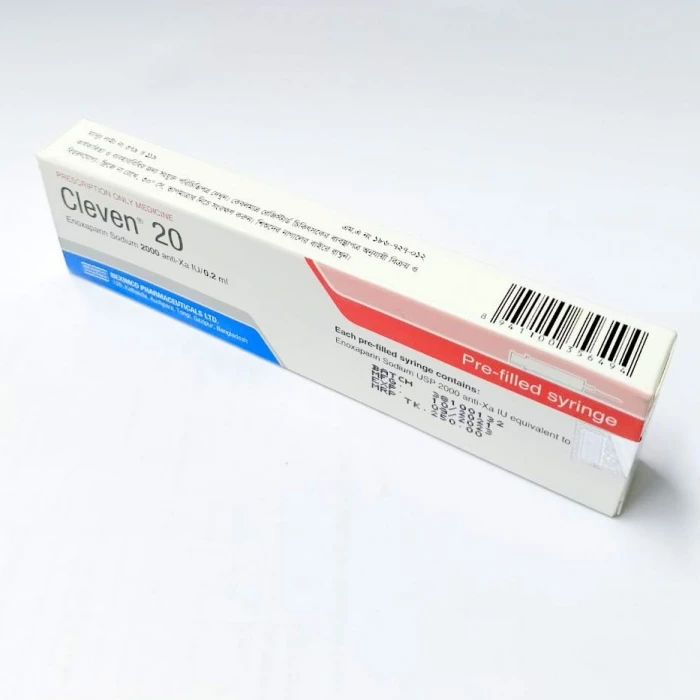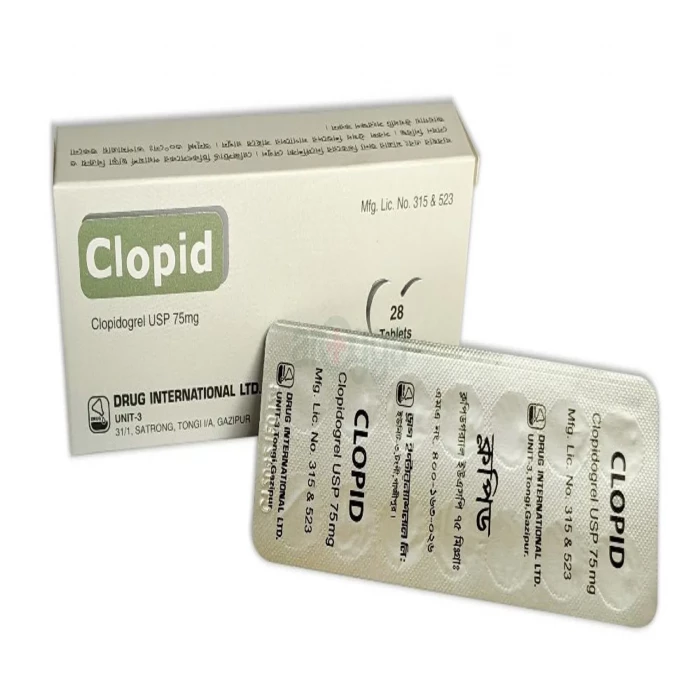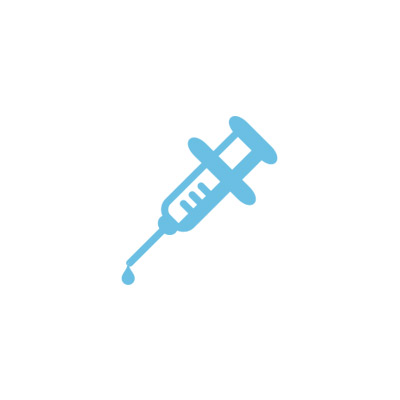
✔ 100% Authentic Product
👁️ Currently Viewing 2066
Intravas 80mg Injection
Enoxaparin is used in the treatment and prevention of Blood clots. It prevents the formation of blood clots and is used to treat conditions such as deep vein thrombosis and pulmonary embolism.
Discount
Price: ৳ 618
MRP:
৳
650
5%
Off

100% Genuine Products, Guaranteed

Safe & Secure Payments, Always

Fast, Secure & Efficient Delivery

Proper Packaging
 Cash on Delivery - All over Bangladesh
Cash on Delivery - All over Bangladesh Regular Delivery - 12-24 Hours, Dhaka City* Charge Tk.39-59
Regular Delivery - 12-24 Hours, Dhaka City* Charge Tk.39-59 Regular Delivery - 24-48 Hours, Other Cities* Charge Tk.99-110
Regular Delivery - 24-48 Hours, Other Cities* Charge Tk.99-110
🌙 রমযান অফার 🌙
 ফ্রি ডেলিভারিঃ - ৭৯৯ টাকা+ অর্ডারে, ঢাকা
শহরে
ফ্রি ডেলিভারিঃ - ৭৯৯ টাকা+ অর্ডারে, ঢাকা
শহরে ফ্রি ডেলিভারিঃ - ২৭৯৯ টাকা+ অর্ডারে, ঢাকার
বাহিরে
ফ্রি ডেলিভারিঃ - ২৭৯৯ টাকা+ অর্ডারে, ঢাকার
বাহিরে
📲 মোবাইল অ্যাপ অর্ডারে সাশ্রয় বেশী
-
Google Play Store থেকে ডাউনলোড
-
Apple Store থেকে ডাউনলোড
100% Genuine Products, Guaranteed
Safe & Secure Payments, Always
Fast, Secure & Efficient Delivery
Proper Packaging
 Cash on Delivery - All over Bangladesh
Cash on Delivery - All over Bangladesh Regular Delivery - 12-24 Hours, Dhaka City* Charge Tk.39-59
Regular Delivery - 12-24 Hours, Dhaka City* Charge Tk.39-59 Regular Delivery - 24-48 Hours, Other Cities* Charge Tk.99-110
Regular Delivery - 24-48 Hours, Other Cities* Charge Tk.99-110 ফ্রি ডেলিভারিঃ - ৭৯৯ টাকা+ অর্ডারে, ঢাকা
শহরে
ফ্রি ডেলিভারিঃ - ৭৯৯ টাকা+ অর্ডারে, ঢাকা
শহরে ফ্রি ডেলিভারিঃ - ২৭৯৯ টাকা+ অর্ডারে, ঢাকার
বাহিরে
ফ্রি ডেলিভারিঃ - ২৭৯৯ টাকা+ অর্ডারে, ঢাকার
বাহিরে- Google Play Store থেকে ডাউনলোড
- Apple Store থেকে ডাউনলোড
🌙 রমযান অফার 🌙
📲 মোবাইল অ্যাপ অর্ডারে সাশ্রয় বেশী
✅ Description:
Intravas 80mg Injection is a type of medication known as a blood thinner or anticoagulant. It is used to treat and prevent harmful blood clots in various medical conditions, such as unstable angina, after surgery or extended bed rest, following a heart attack, and to prevent blood clot formation in dialysis machine tubes.
The active ingredient in Intravas 80mg Injection is Enoxaparin, which is a low molecular weight heparin. It works by stopping existing blood clots from getting larger, allowing the body to break them down and prevent them from causing harm. Additionally, it helps prevent the formation of new blood clots in the bloodstream.
It's essential to have Intravas 80mg Injection 0.8 ml administered by a healthcare professional and not attempt to self-administer. Some possible side effects may include bleeding, increased liver enzymes, skin rash, itching, bruising, pain at the injection site, and headaches. These side effects are generally temporary and do not usually require medical attention. However, if they persist, it's essential to inform your doctor promptly.
Before receiving Intravas 80mg Injection 0.8 ml, inform your doctor if you have any allergies to this medication or any other drugs. If you are pregnant or breastfeeding, it's crucial to discuss this with your doctor beforehand. Inform your doctor about any pre-existing medical conditions you may have, such as stomach ulcers, recent brain, eye, or spine surgery, recent bleeding stroke, diabetes, high blood pressure, recent stroke, kidney or liver disorders, and if you have high levels of potassium in your blood. Your doctor will take these factors into consideration to ensure the safe use of the medication.
Safety Advices

Alcohol
UNSAFE
Avoid consumption of alcohol before receiving Intravas 80mg Injection.

Pregnancy
CONSULT YOUR DOCTOR
Intravas 80mg Injection is not recommended for use in pregnancy. Your doctor will weigh the benefits and risks before prescribing this medicine to you.

Breastfeeding
CONSULT YOUR DOCTOR
Intravas 80mg Injection is not recommended for use in breastfeeding. Your doctor will weigh the benefits and risks before prescribing this medicine to you.

Driving
CAUTION
Intravas 80mg Injection does not affect your ability to drive or operate machinery. However, do not drive or handle any heavy tools or machines if your ability is affected by Intravas 40mg Injection.

Kidney
CONSULT YOUR DOCTOR
Intravas 80mg Injection may increase the risk of bleeding if you have kidney problems. Your doctor may adjust the dose of this medicine or prescribe a suitable alternative based on your condition.

Liver
CONSULT YOUR DOCTOR
Intravas 80mg Injection is known to increase the levels of liver enzymes causing serious complications. Therefore, it should be used with caution if you have liver problems.
✔️ Uses of Intravas 80mg Injection
- Treatment and prevention of Blood clots
✔️ How does Intravas 80mg Injection work?
Intravas 80mg Injection is an anticoagulant medicine. It inactivates certain proteins (such as coagulation factor II a and X a) in the blood that causes blood clotting. This reduces the chances of blood clot formation within the body which therefore prevents blockage of blood vessels.
✔️ Side Effects of Intravas 80mg Injection
- Bleeding
- Headache
- Low blood platelets
- Increased liver enzymes
- Anemia (low number of red blood cells)
- Fever
- Injection site pain
- Breathing problems
- Edema (swelling)
- Diarrhea
✔️ Quick Suggestions:
- Following a low-cholesterol diet can complement the treatment with Intravas 80mg Injection and promote heart health. Avoiding high cholesterol and saturated fats can help reduce the risk of blood clot formation and improve overall cardiovascular health.
- Engaging in regular physical activity is crucial for preventing blood clots and maintaining good circulation. Exercise can also help manage cholesterol levels and reduce the risk of complications.
- As alcohol can increase the risk of gastrointestinal bleeding, it's best to abstain from it during Intravas 80mg Injection treatment. Additionally, avoiding junk food items from outside and opting for freshly prepared home-cooked meals can provide better nutrition and support recovery.
- Choosing heart-healthy unsaturated fats over saturated fats can help reduce total cholesterol and LDL levels. Foods like avocados, olive oil, fatty fish, and nuts are excellent sources of unsaturated fats.
- Intravas 80mg injection may lower vitamin K levels in the body, so including foods rich in vitamin K like liver, leafy green vegetables, or vegetable oils in the diet can help maintain proper levels.
- Intravas 80mg Injection increases the risk of bleeding, so it's important to be careful while handling sharp objects, shaving, or cutting nails. Inform your doctor if you are taking other medications that may increase bleeding risk, like aspirin and NSAIDs.
- Watch out for signs of bleeding, such as bleeding from gums, nose, wounds that last longer than 15 minutes, or the presence of blood in urine, stool, or vomit. Inform your doctor immediately if any of these symptoms occur.
- Cranberry juice, grapefruit juice, noni juice, and pomegranate juice may interact with Intravas 80mg Injection and cause unwanted side effects. It's best to avoid these juices while on the medication.
- Regular blood tests are advised while taking Intravas 80mg Injection to monitor prothrombin, platelets, and coagulation time to ensure the medication's appropriate and safe use.
✔️ Indication of
Intravas 80mg Injection is prescribed to address various medical conditions related to blood clotting, including:
- Deep Vein Thrombosis (DVT): This condition involves the formation of blood clots, typically in the legs, in the deep veins.
- Pulmonary Embolism (PE): It refers to blood clots that travel to the lungs and block blood vessels there, posing a significant health risk.
- Preventing Blood Clots in Dialysis Machine Tubes: Intravas 80mg Injection helps prevent the formation of blood clots in the tubes of dialysis machines, which are used for patients undergoing kidney dialysis.
- Post-Surgery and Operation Clot Prevention: After surgical procedures, there is an increased risk of blood clots forming. Intravas 80mg Injection is used to prevent their formation during and after surgery.
- Preventing Blood Clots After Heart Attack or Angina Attack: Following a heart attack or an angina attack, there is a heightened risk of blood clot formation. Intravas 80mg Injection is administered to prevent this occurrence and its potential complications.
- Preventing Blood Clots in Bedridden Patients: In patients who are confined to bed due to acute illnesses, there is an increased risk of blood clots forming. Intravas 80mg Injection is used as a preventative measure in such cases.
In all these scenarios, Intravas 80mg Injection, containing Enoxaparin, a low molecular weight heparin, is employed as an anticoagulant or blood thinner to reduce the risk of harmful blood clots, thereby safeguarding patients from potentially serious consequences like stroke, organ damage, or even death. It is crucial to have this medication administered under the supervision of a healthcare professional. Additionally, patients are advised to inform their doctor about any allergies or pre-existing medical conditions before receiving this medication.
✔️ Pharmacology
Enoxaparin is a low molecular weight heparin (LMWH) with anticoagulant properties. It works by enhancing the inhibition of activated clotting factors, particularly thrombin and factor Xa, through its interaction with antithrombin III. Antithrombin III is a natural anticoagulant in the body that inhibits the activity of various clotting factors. Enoxaparin helps antithrombin III in its role, leading to a reduction in blood clot formation.
By targeting specific clotting factors, Enoxaparin is effective in preventing the growth of existing blood clots and reducing the formation of new ones, thereby reducing the risk of complications associated with blood clots, such as deep vein thrombosis (DVT), pulmonary embolism (PE), and other clot-related conditions.
✔️ Dosage & Administration of
Enoxaparin Sodium is used in the treatment and prevention of various conditions related to blood clotting. The dosing and administration of Enoxaparin vary depending on the specific medical condition being treated. Here are some key points to note regarding its use:
- Deep Vein Thrombosis (DVT) and Pulmonary Embolism (PE) Treatment:
- Option 1: Subcutaneously administer 100 anti-Xa IU/kg twice daily for 10 days.
- Option 2: Subcutaneously administer 150 anti-Xa IU/kg once daily for 10 days.
- Oral anticoagulant therapy should be started when appropriate, and Enoxaparin treatment should be continued until a therapeutic anticoagulant effect is achieved.
- Unstable Angina and Non-Q-Wave Myocardial Infarction Treatment:
- Subcutaneously administer 100 anti-Xa IU/kg twice daily for 2 to 8 days.
- Should be given concurrently with oral aspirin (100 to 325 mg once daily).
- Treatment with Enoxaparin should be prescribed for a minimum of 2 days and continued until clinical stabilization.
- Prevention of Thrombus Formation During Hemodialysis:
- The recommended dose is 100 anti-Xa IU/kg.
- For patients at high risk of bleeding, the dose may be reduced to 50 anti-Xa IU/kg for double vascular access or 75 anti-Xa IU/kg for single vascular access.
- Enoxaparin should be introduced into the arterial line of the circuit at the beginning of the dialysis session.
- Prophylaxis of Venous Thromboembolic Disease in Surgical Patients:
- For general surgery with a moderate thromboembolism risk (e.g., abdominal surgery), subcutaneously administer 2000 anti-Xa IU (0.2 ml) or 4000 anti-Xa IU (0.4 ml) once daily for 7 to 10 days. The first injection should be given 2 hours before the surgical procedure.
- For orthopedic surgery with a high thromboembolism risk, subcutaneously administer 4000 anti-Xa IU (0.4 ml) once daily for 7 to 10 days. The first injection should be given 12 hours before the surgical procedure. In some cases, a longer treatment duration may be appropriate, such as continued therapy with 4000 anti-Xa IU once daily for 3 weeks following the initial therapy in orthopedic surgery.
- Prophylaxis of Venous Thromboembolic Disease in Medical Patients:
- Subcutaneously administer 4000 anti-Xa IU (0.4 ml) once daily for 6 to 14 days.
It's essential to follow the dosing instructions provided by your doctor or healthcare professional. Enoxaparin is usually administered subcutaneously, and it should not be self-injected. It is typically given in a hospital setting, and patients should not attempt to administer it on their own. Proper care and monitoring for signs of bleeding are essential during Enoxaparin therapy.
If you have any concerns or questions about the treatment, dosing, or administration, it's crucial to discuss them with your healthcare provider to ensure the safe and effective use of the medication.
✔️ Interaction
Before receiving Intravas 80mg Injection, it is crucial to inform your doctor about any other medications you are taking to avoid potential interactions or complications. Some medications may interact with Intravas 80mg Injection and affect its effectiveness or increase the risk of bleeding. Here are some specific medications to mention to your doctor:
- Warfarin: A blood-thinning medication used to prevent blood clots.
- Other medicines used to prevent blood clots: This may include drugs like aspirin, clopidogrel, and dipyridamole.
- Dextran injection: A medication used to replace blood volume.
- Pain and anti-inflammatory medications: Medications like ibuprofen, diclofenac, ketorolac, and tromethamine can also affect blood clotting.
- Medications for asthma and rheumatoid arthritis: Drugs like prednisolone and dexamethasone may interact with Intravas 80mg Injection.
- Medications that increase blood potassium levels: Drugs like spironolactone, triamterene, and amiloride may interact with Intravas 80mg Injection.
- Sulfinpyrazone: A medication used to prevent gout.
✔️ Contraindications
- If you are allergic to enoxaparin or any other ingredients of Intravas 80mg Injection.
- If you are suffering from any blood disorder or have any bleeding in the gastrointestinal tract.
✔️ Pregnancy & Lactation
The use of enoxaparin during pregnancy should be approached with caution and only under the close supervision of a healthcare professional. Human data from a retrospective cohort study suggest that enoxaparin does not increase the risk of major developmental abnormalities. However, it's important to note that pregnancy itself confers an increased risk of thromboembolism, which may be higher for women with pre-existing thromboembolic disease and certain high-risk pregnancy conditions.
Pregnant women with mechanical prosthetic heart valves may be at even higher risk for thrombosis. Those with thromboembolic disease or inherited/acquired thrombophilias are also at an increased risk of other maternal complications and fetal loss, regardless of the type of anticoagulant used.
All patients, including pregnant women, receiving anticoagulants are at risk of bleeding, and pregnant women on enoxaparin should be closely monitored for any signs of bleeding or excessive anticoagulation. Hemorrhage can occur at any site and may have serious consequences for both the mother and the fetus.
The potential hazards to the fetus and mother should be considered if enoxaparin therapy is administered during pregnancy. The decision to use enoxaparin in pregnant women should be carefully weighed against the potential benefits and risks, and the patient should be informed of the potential risks to both the mother and the fetus.
Regarding lactation, it is not known whether enoxaparin is excreted into human milk. In lactating rats, the passage of enoxaparin or its metabolites into milk is very limited. However, there is no information available on the effect of enoxaparin on breastfed infants or on milk production. The developmental and health benefits of breastfeeding should be considered along with the mother's clinical need for enoxaparin therapy and any potential adverse effects on the breastfed child from the drug or the underlying maternal condition.
As there is uncertainty and limited data regarding the safety of enoxaparin during pregnancy and lactation, it is generally not recommended to use this medication in these situations unless the potential benefits outweigh the potential risks and other treatment options are not suitable. Pregnant or lactating women should discuss their individual circumstances with their healthcare provider to determine the most appropriate treatment plan.
✔️ Precautions & Warnings
It is essential for patients to inform their doctors if they are on active treatment with Intravas 80mg Injection before any surgery is scheduled. This is crucial because Intravas 80mg Injection is an anticoagulant, and its use may need to be adjusted or temporarily stopped before certain surgical procedures to minimize bleeding risks.
- Additionally, patients should inform their doctor if they have any allergies to Intravas 80mg Injection or any other medications. Allergic reactions to medications can be serious and should be taken into account before starting any treatment.
- If a patient is pregnant or breastfeeding, it is essential to inform their doctor before using Intravas 80mg Injection. The use of this medication during pregnancy and lactation should be carefully evaluated, considering the potential benefits and risks to both the mother and the baby.
- Disclosing any pre-existing medical conditions to the doctor is vital before using Intravas 80mg Injection. Conditions like stomach ulcers, recent brain, eye, or spine surgery, recent bleeding stroke, diabetes, high blood pressure, recent onset of stroke, kidney or liver disorders, and high levels of potassium in the blood may require special attention or adjustments in the treatment plan.
Moreover, the doctor should be informed if the patient is underweight or overweight, as these factors can influence the dosage and response to the medication.
Overall, open communication with the doctor about medical history and any ongoing treatments is crucial for ensuring the safe and effective use of Intravas 80mg Injection and minimizing potential risks or complications.
✔️ Storage Conditions
Store below 25°C
⚠️Disclaimer:
At ePharma, we’re committed to providing accurate and accessible health information. However, all content is intended for informational purposes only and should not replace medical advice from a qualified physician. Please consult your healthcare provider for personalized guidance. We aim to support, not substitute, the doctor-patient relationship.




